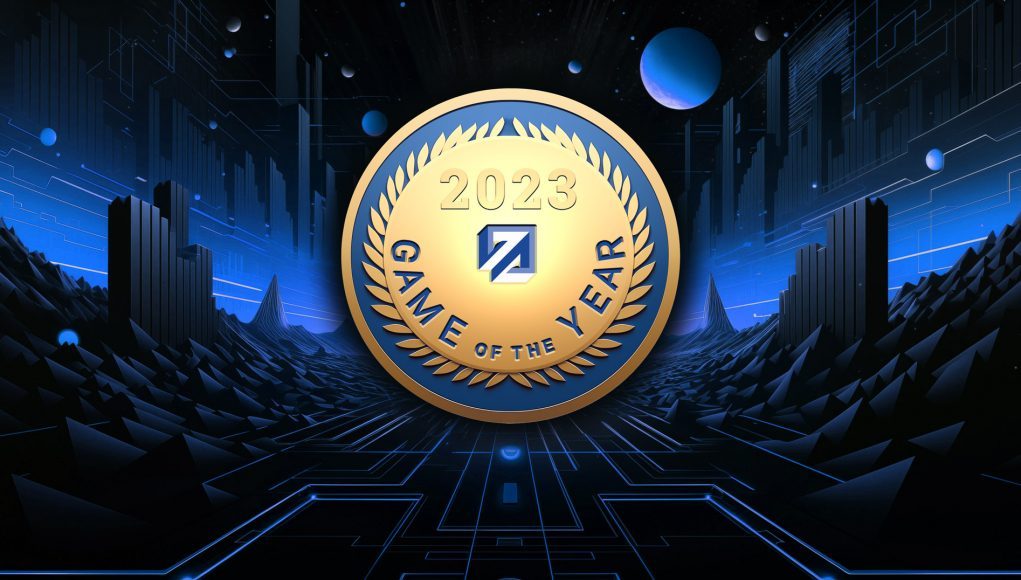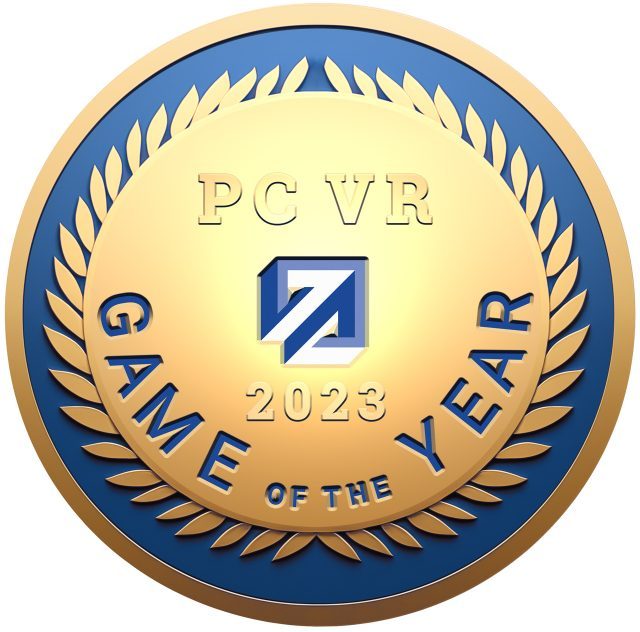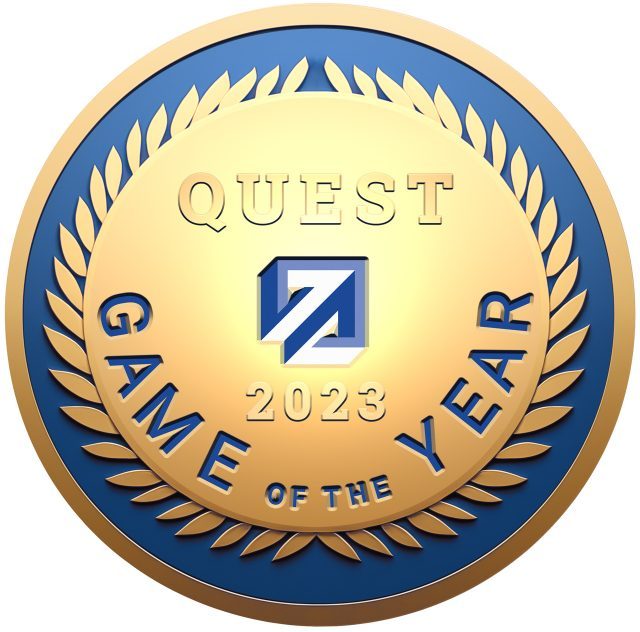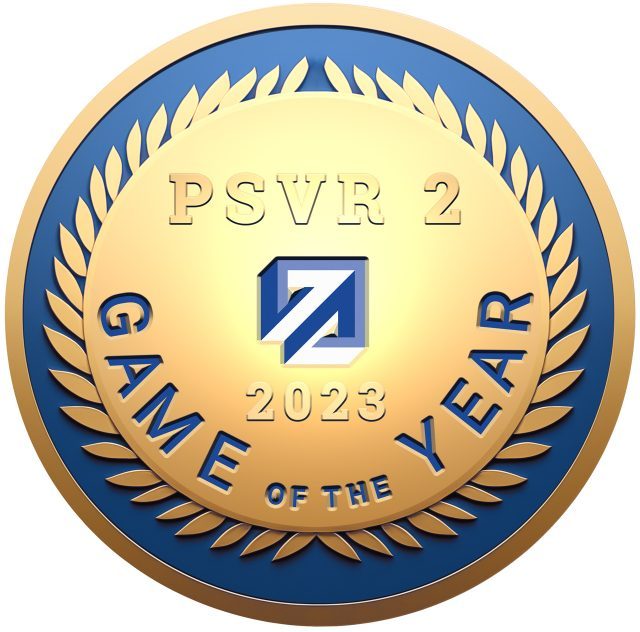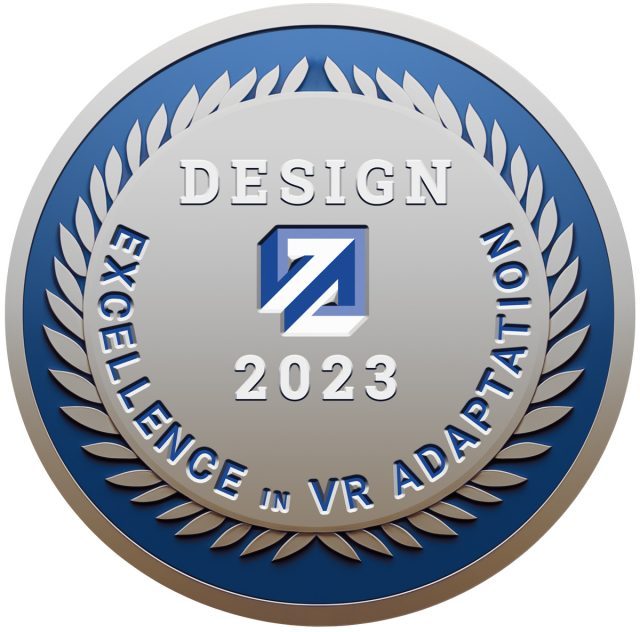“Virtual reality is dead.” That’s what we’ve been told about every six months for the better part of a decade now. Anyone who’s been following the space though knows that more people than ever are playing VR games and opening portals to other dimensions right where their living rooms, home offices, or dorm rooms used to be.
Another year has passed, and here we are again—celebrating the best VR games that kept us coming back for more. Now in our seventh annual Game of the Year Awards, we’ve seen several high budget, multi-year projects come to fruition, which is something only a more mature VR games industry could ever hope to support. We’re there. That’s today.
This past year, we’ve also played games that continue to push the medium forward, not by the virtue of giant production budgets, but by sheer sweat equity. Small but highly capable teams are making an impact by creating things that might not all be “safe bets”, but still manage to attract hardcore fan bases thanks to innovative gameplay and continued developer support well after launch. Be it big or small though, every team is standing on the shoulders of the collective VR community, who continue to experiment and create the sort of hard-won best practices that, to this day, help make VR games comfortable, immersive, and most of all, fun.
Without further ado though, we present Road to VR’s 2023 Game of the Year Awards:
Game of the Year
Vertigo 2
Developer: Zach Tsiakalis-Brown
Publisher: Zulubo Productions
Available On: PC VR, PSVR 2 (coming soon)
Release Date: March 30th, 2023
Vertigo 2 is the sequel to the hit PC VR shooter, this time returning you to the belly of its Half-Life-inspired science facility which houses a vast Quantum Reactor. It’s not all blasting away at baddies and making your way back home; the Vertigo series injects a ton of heart and good humor to go alongside a cast of weird characters that feel so patently meme-worthy, funny and imaginative.
Underlining the madcap action are some very smart mechanics, the biggest standout of which being its VR-native gun controls and unique reloading for each weapon, which are so immersive their design language should be used widely across VR. The summation makes for an adventure that will not only keep you guessing as to what’s next, but immersing you into an absolutely massive universe that truly feels solid and alive.
You’d be pretty surprised to know that this 10-hour VR-native was essentially created by a single person, Zach Tsiakalis-Brown. That’s certainly not why we gave Vertigo 2 our PC VR Game of the Year award; we’re honoring it purely on its own merits for delivering the whole package—smart design, engaging VR-native mechanics, and a fun and memorable story that will stick with you well beyond the end credits.
Want to learn more about Vertigo 2? Read our full review to find out why we gave it [9.5/10].
Asgard’s Wrath 2
Developer: Sanzaru Games
Publisher: Oculus Studios
Available On: Meta Quest (exclusive)
Release Date: December 15th, 2023
Asgard’s Wrath 2 is massive in every measurable dimension. It’s bigger, deeper and basically everything we hoped it would be when Meta first announced in September that Quest would be the exclusive platform to host the game’s sequel, the original of which landed on Rift in 2019.
Besides being a behemoth at 100+ hours in gameplay length, the sequel serves up an incredible depth and scale that is unrivaled on Quest, raising the bar for what you might consider “full-length” content on Meta’s fleet of standalones. Essentially, Asgard’s Wrath 2 is to the Quest platform what Half-Life: Alyx (2020) is to PC VR headsets.
To boot, Meta-owned studio Sanzaru Games have potentially also created the most expensive Quest game to date in terms of development dollars. It definitely shows in the game’s dense and detailed visuals, which although somewhat flatter than a game with the horsepower of a dedicated GPU, nearly approaches what you might see on PC VR headsets. Some might argue that speaks to more about what’s typically available on Quest, and less about what can actually be done with the standalone hardware.
Whatever the case, Asgard’s Wrath 2 not only stands out from the pack on Quest, but it’s a excellent game in any context and on any headset.
Horizon Call of the Mountain
Developer: Guerrilla Games & Firesprite
Publisher: Sony Interactive Entertainment
Available On: PSVR 2 (exclusive)
Release Date: February 22nd, 2023
Horizon Call of the Mountain is the first major first-party IP that Sony offered up as a VR game. And the company doubled down by making it not just a launch title for the newly launched PlayStation VR 2, but they even offered it up as a bundle launch bundle with the headset itself.
Lucky on not, Horizon Call of the Mountain turned out to be the perfect launch title to show players what the company’s new headset was capable of. Not only does it offer an immersive buffer of rich VR gameplay with some of the best looking visuals in any VR game to date, it also takes advantage of PSVR 2’s most unique features, like eye-tracking, reactive triggers, and head-haptics.
Though it didn’t capture the open-world gameplay of its brethren, Horizon Call of the Mountain found compelling gameplay in now-classic VR mechanics like climbing and bow shooting while managing to innovate in its own right with immersive crafting and a unique locomotion system during combat sequences.
Perhaps the only big flaw with Sony’s plan to launch its headset alongside this exciting adventure is that there hasn’t been any games of quite this scale on the headset since!
Want to read more about Horizon Call of the Mountain? Check out our full review of the game and our behind-the-scenes feature article on the title’s development.
Design Awards
Assassin’s Creed Nexus VR
Developer: Ubisoft
Available On: Meta Quest (exclusive)
Release Date: November 16th, 2023
Assassin’s Creed Nexus VR had the daunting task of figuring out how to bring one of the franchise’s staple elements—parkour—into VR in a way that’s comfortable and compelling. And as it turns out, the solution meant leaning into Ubisoft’s existing parkour tech that was never designed with VR in mind.
From the outset, the Assassin’s Creed games were defined by their awesome third-person locomotion that gave players unprecedented freedom to traverse the world as well vertically as horizontally. That’s thanks in no small part to a carefully crafted system that determines which parts of the game’s geometry constitute valid handholds and how the character should animate from one position to the next.
Though it was conceived long before the age of modern VR, the developers of Assassin’s Creed Nexus VR cleverly adapted the concept for VR such that players can hold down a button and automatically leap between obstacles as easily as looking in the direction they want to go—any movement done with your legs is accomplished this way. But to fuse this with VR gameplay, anything involving the arms—for instance, grabbing onto a hold that’s higher than your feet can reach, pulling yourself up over a ledge, or swinging from a pole—must be done by manually reaching out and making it happen with your own two hands.
Couple that with carefully crafted comfort considerations (say that three times fast)—like the precise speed and trajectory of automated leaps—and Assassin’s Creed Nexus VR delivered that classic franchise feeling of seeing almost anything as climbable and anywhere as reachable, while staying mostly comfortable in VR.
Dungeons of Eternity
Developer: Othergate
Available On: Meta Quest (exclusive)
Release Date: February 22nd, 2023
As a co-op fantasy dungeon crawler, Dungeons of Eternity seems like the last place you’d go looking for an innovative VR interface. But that didn’t stop developer Othergate from trying anyway.
While the game does ultimately fall back on basic laser-pointer menus at the foundational level, the studio fleshed out the game’s ‘menu’ system into an immersive lobby that’s shared by you and your friends.
Common game functions like selecting a level, crafting weapons, and readying up have all been effortlessly translated into this immersive space. Selecting a level means approaching the map table and picking your mission. To craft weapons you’ll want to run down to your equipment room where you’ll find your workbench. And readying up isn’t a button press, but physically walking over to the teleporters to beam up with your teammates.
In many games, all of this would happen purely with text on a screen, but manifesting those functions as a physical lobby feels natural, especially because of the social aspect. If your friend is in their equipment room, you know exactly what they’re up to. Same thing if you see them looking over the map table. That’s contraty to many multiplayer flatscreen games where menus are wholly individual affairs and you’ll often find teammates asking each other “are you ready?” “are you picking a level?”.
That idea of sharing information between teammates carries into the game’s mini-map system too. Rather than pressing a button to make a flat map appear on your screen, mini-maps are physical items—little spherical projectors—that you first have to find inside a level. Once you do, you can pull the projector out and toss it on the ground to project a 3D map of the dungeon that you and your teammates can collectively see.
Physical item as map UI in @DungeonsVR. Not only more immersive, but also inherently collaborative between multiple users. This is the way. pic.twitter.com/Pwps7EnyCR
— Ben Lang (@benz145) October 9, 2023
This not only feels way more immersive than summoning a flat map with a button, but it also makes for natural collaboration as players can simply point to one part of the map as they’re talking about it.
Arizona Sunshine 2
Developer: Vertigo Games
Available On: PC VR, Meta Quest, PSVR 2
Release Date: December 7th, 2023
For the first time we’re giving a double-award to a single title. Arizona Sunshine 2 earns both Excellence in Immersion and Excellence in Co-op—and here’s why.
We really appreciated the game’s attention to immersive detail. Most things that seem like they should be interactive consistently are. Doors, cabinets, drawers, and even ovens all open as expected. Windows shatter. TVs break. Shopping carts roll. Swivel chairs spin. And on top of that there’s a healthy dose of simple but fun interactive props like basketballs, ping pong balls, and cigarettes that you light and even put in your mouth to take a puff. And your dog companion, Buddy? Not only will he fetch tennis balls that you throw, you can even pet him to make sure he knows who’s a good boy.
All of this is interactive goodness is amplified thanks to the game’s co-op capability which allows two players to play the entire campaign together. Discovering the game’s many interactive props and immersive details is that much more fun when you’re doing it with a friend. And thanks to the game’s wide release on all major VR platforms, and cross-platform co-op, it’s very likely that you can actually play with the friend you want to without having to convince anyone to buy a new headset!
The Light Brigade
Developer: Funktronic Labs
Available On: PC VR, Meta Quest, PSVR 2
Release Date: February 22nd, 2023
The Light Brigade is a single player roguelike shooter that you might compare to In Death: Unchained, the critically acclaimed bowshooter from Sólfar Studios and Superbright. Developed by indie studio Funktronic Labs, The Light Brigade lets you step foot into an eerie, shattered world, pitting you against demon soldiers using a variety of World War weaponry. It’s a highly stylized, lower-poly affair that is all works really well visually, creating an ambiance that’s memorable and feeling like some spooky lovechild of Dark Souls and Wolfenstein.
While procedurally generated levels in other games can leave you feeling like you’re running around in circles or retreading the same old places, The Light Brigade does an excellent job of blending varied and unique environments to make them challenging every single run.
This roguelike is of course mostly about blasting dudes in the head, although the upgrade tree has a good number of pathways and bonus features—all of which is important to build up stats capable of meeting the final boss. More than not, you’ll end up dying another untimely death, as baddies get harder relative to your growing strength, offering good challenge. In the end, The Light Brigade well balanced, appropriately bitey, and addictive in a way only truly great roguelikes can be.
Hotdogs, Horseshoes & Hand Grenades
Developer: RUST LTD
Available On: PC VR
Release Date: April 5th, 2016
Hotdogs, Horseshoes & Hand Grenades (H3VR) is the definition of a game that keeps on giving. Developer RUST LTD could have abandoned the VR shooter sandbox long ago and still made its over 18,000 Steam reviewers happy with the breadth of content available.
Still in Early Access since its entrance on Steam in 2016, the game presents PC VR players with extremely realistic models of basically every firearm on the planet. Although one of the big focuses initially was plinking at the range, over the years the studio has added a dizzying number of shooter game modes, including things like a sci-fi action roguelite, a zombie shooter, a VR adaptation of Team Fortress 2, and other stuff that feature puzzles, mazes and over a dozen more individual modes to explore. Wherever you go though, you won’t be blasting away at humans: only wibbly hotdog people who shatter into mushy little bits when you shoot them.
As a testament to H3VR’s staying power, the game’s most recent update came earlier this month—over seven years since it launched into EA—introducing new firearms and a host of improvements and quality of life updates. And it’s not showing any signs of stopping either. The studio says it doesn’t know when it will leave Steam Early Access, just that it’s “still having a blast adding things,” and that the sandbox format allows them to grow organically “through a series of experiments, varying from freeform sandbox to more traditionally structured games.”
LEGO Bricktales
Developer: ClockStone STUDIO
Publisher: Thunderful Publishing AB
Available On: Meta Quest exclusive)
Release Date: December 7th, 2023
LEGO Bricktales didn’t start out life as a VR-native, but if you’ve played the plucky little brick-building adventure for a minute or two, you’d swear it wasn’t a port at all.
As a Quest-exclusive, the port feels at home in both pure VR and Quest’s optional passthrough MR, as the big focus here is adding more tactility to building models than you might with keyboard and mouse. With a horizon locked ‘snap-in’ building guide, Bricktales makes it easy to create nearly anything with your own two hands with minimal fuss you might otherwise associate with guiding tiny bricks into place.
Granted, you can’t go completely wild and build just whatever, as you’re tasked with focusing on objective-based builds to do things like getting across rivers, building helicopters, and completing sculptures. Still, you’ll have plenty of pieces though to let your imagination take over.
The family-friendly story may feel at times a little too aimed at kids, but I dare anyone not to look at the little dioramas made of true-to-life Lego pieces and think to yourself “if I had this as a kid I would flip!” In fact, we’re flipping even as adults, as LEGO Bricktales provides a nostalgia rush for anyone who’s put down the plastic blocks long ago.
Note: Games eligible for Road to VR‘s Game of the Year Award must be available to the public on or before December 15th, 2023 to allow for ample deliberation. Games must also natively support the target platform as to ensure full operability.

